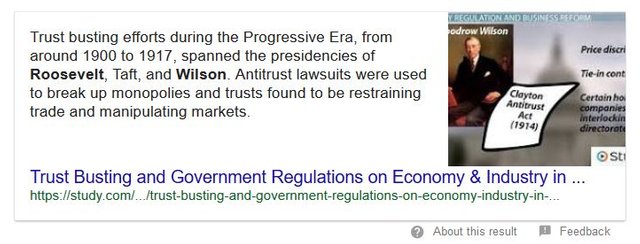The Hidden Goals of Trust Busting: Introduction
[I'm researching the real history of trust busting in the US, and it's not the same history you were taught about Teddy Roosevelt and the Progressives in school. My research will be presented in a series of posts, though this one is purely introductory and intended to give a basic overview of the historical context.]

The trusts emerging in the late 1800s weren't exercises in corporate greed, as we tend to think. The merger trend that was just beginning was largely the result of progressive thinking that integration and cooperation were preferable to cut-throat business competition. If two corporations found themselves in competition, progressive thinking suggested the two should join forces rather than work against one another.
Progressives started writing about goals like efficiency and cooperation as early as 1864: “We are at the outset of a new era in social progress and one which is probably the highest to which material civilisation can attain. It is the era of cooperation. Hitherto competition has been regarded as the most efficient agent of social progress. But the principle of competition is one of rivalry and struggle. It is a system of beggar-my neighbour, most useful in the earlier stages of civilisation, but one most unworthy of civilisation at its maturity. It is costly, for it requires many companies and establishments to do the work which would be more economically performed by one.” (from "The City of Gold,” Blackwood’s Edinburgh Magazine, September 1864)
Integration and cooperation meant the combining and concentration of formerly separate businesses, all in the name of efficiency. This is how progressivism began.
But there was a strong reaction against this type of business concentration that came to be known as the trust busting movement. Schools still teach that it was progressives who were the trust busters, but that’s simply not accurate. The Progressive Party’s own platform clearly stated, “The concentration of modern business, in some degree, is both inevitable and necessary for national and international business efficiency.”
So if the progressives didn’t start the trust busting movement, who did?
It was actually another group called the Populists. Farmers were the first populists and populism was also known as the “rural revolt” because it existed in rural farming communities, away from city centers. Early populists were small, midwestern farmers who had two problems: they were heavily in debt, and were competing with larger, more efficient, “progressive” farms back east. For the populists, efficiency and larger size were not things to be rewarded.
Tenant farmers and sharecroppers, the grassroots members of the Populists, needed a way to compete with these larger farms. One way was to label them “land monopolies” and ask the federal government to prohibit corporations from owning more land than they require, especially regarding land grants for the railroad companies made possible by the Department of the Interior. There were already laws against monopolies in several states, but farmers began this move toward federal laws, hoping to eliminate their competition with larger farms in other states.
Today we think of government efforts to prevent a monopoly as an effort to prevent the higher prices a monopoly usually charges consumers. But the odd thing about the first federal law to result against monopolies - the Sherman Antitrust Act - was that it wasn’t intended to prevent the high prices that hurt consumers. It was intended to prevent low prices that were hurting producers. Next time, we'll dive into the Sherman Antitrust Act and see how trust busting was actually done, and why.



You did exactly right by reporting that jerk who stole your post. informationwar people are moral and will stick up for what is right.
In regards to your post. Very nice and interesting subject.
"It is costly, for it requires many companies and establishments to do the work which would be more economically performed by one."
To me this was really about hiding the fact that they meaning the corporations didn't want to compete with one another. Making the movement really a wolf in sheep's clothing. The corporations where and still are wanting monopolies so that they can over charge and rake in the profit.
I am interested in your take on the Sherman Antitrust Act and hope when you post in post promotions that you stop by in general and give me a heads up.
Nice post @geke
Will do and thank you for the support @commonlaw!
Fascinating. I look forward to reading the rest of the series. I've never looked back on the origins of a lot of this stuff. It certainly helps give some context.
Yeah, with government, nothing is ever as it seems. But you already knew that. 😜
Curated for #informationwar (by @wakeupnd)
Our purpose is to encourage posts discussing Information War, Propaganda, Disinformation and other false narratives. We currently have over 7,500 Steem Power and 20+ people following the curation trail to support our mission.
Join our discord and chat with 150+ fellow Informationwar Activists.
Ways you can help the @informationwar
To listen to the audio version of this article click on the play image.

Brought to you by @tts. If you find it useful please consider upvoting this reply.
You got a 43.76% upvote from @ocdb courtesy of @geke!